Stories That Work: “Log Entry” by Kevin J. Anderson, and “Sweetly the Dragon Dreams” by David Farland
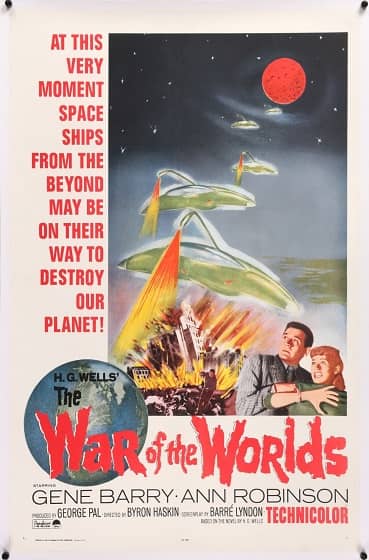 |
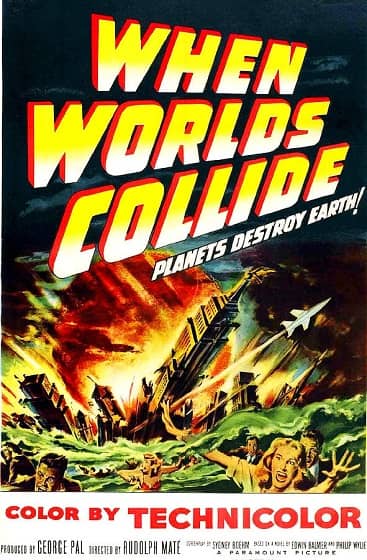 |
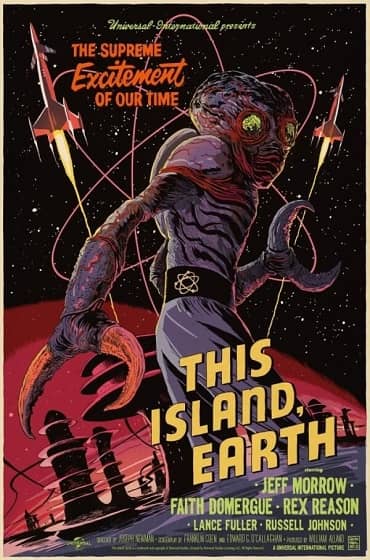 |
Space-based science fiction drew me into reading hard when I started. The fact that my dad was an aeronautical engineer who worked at Martin Marietta, designing the first rockets in America’s space program, probably helped. Copies of Sky and Telescope were scattered about the house, and Dad’s amateur astronomy often became a part of dinner conversation. He ground his own mirror for a reflecting telescope he built and mounted in the backyard, and several times he invited my class at the elementary school over for hot chocolate and star gazing.
Tom Corbett, Robert Heinlein’s Space Cadet, and E.E. Doc Smith’s Skylark of Space started my fascination with space travel. When I was young I thought “space fiction” and “science fiction” were interchangeable terms. Hooray for Buck Rogers and Forbidden Planet, War of the Worlds, When Worlds Collide, and, especially, This Island Earth.
However, science fiction contains way more than space-based stories even as it continues to tell them in film in Star Wars, The Expanse, Battlestar Galactica, Star Trek, and others.
Still, what is a reader to do when looking for short, space-based science fiction? Analog almost always features a space story or two, as do the other major magazines. But what if you want to mainline the stuff? What if you just want to strap into a ship and blast to the stars?
What if you want to feed your inner twelve-year-old space jockey?
[Click the images for space-sized versions.]
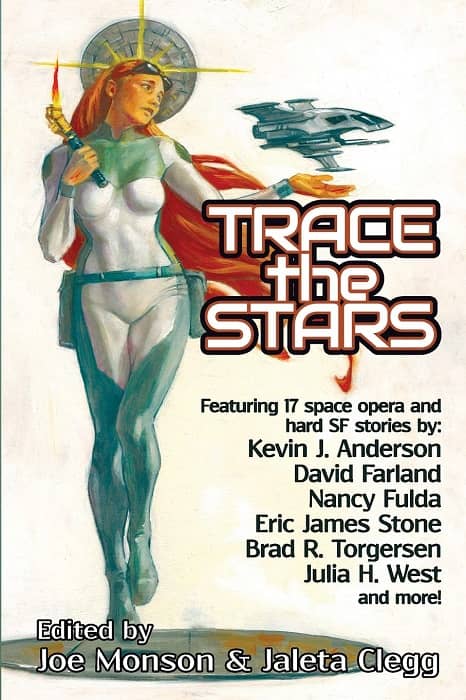 |
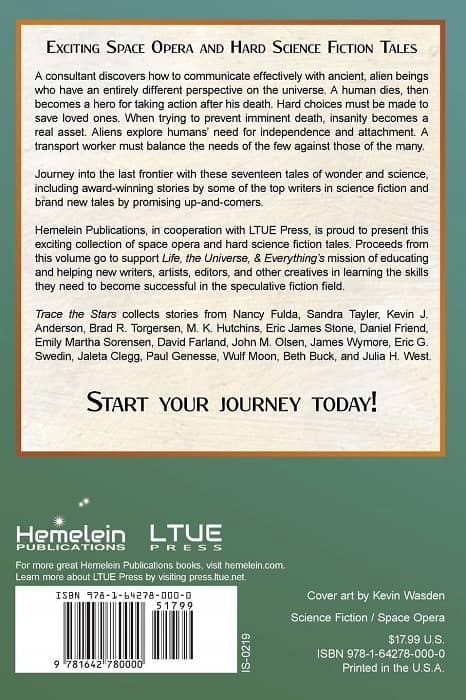 |
Trace the Stars (Hemelein Publications, 313 pages, January 2019). Cover by Kevin Wasden
Editors Joe Monson and Jaleta Clegg serve up a proper buffet of space opera in their recently released anthology, Trace the Stars. Several stories stood out in the collection, including Nancy Fulda’s “Angles of Incidence,” Brad Torgersen’s “The Ghost Conductor of the Interstellar Express,” and Sandra Taylor’s “The Road Not Taken,” but the pieces that worked best for me were Kevin J. Anderson’s “Log Entry,” and David Farland’s “Sweetly the Dragon Dreams.”
Kevin Anderson’s pedigree as a storyteller par excellence needs little repetition here. My first real encounter with him, however, was when he edited the amazing War of the Worlds: Global Dispatches anthology, which included the hysterical Howard Waldrop’s “Night of the Cooters,” and Connie Willis’ Hugo-award-winning “The Soul Selects her own Society: Invasion and Repulsion: A Chronological Reinterpretation of Two of Emily Dickinson’s Poems: A Wellsian Perspective.”
I paid a lot of attention to him after that book.
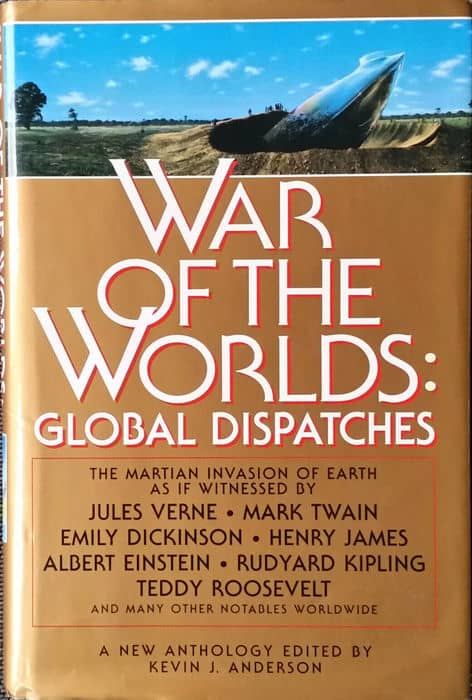 |
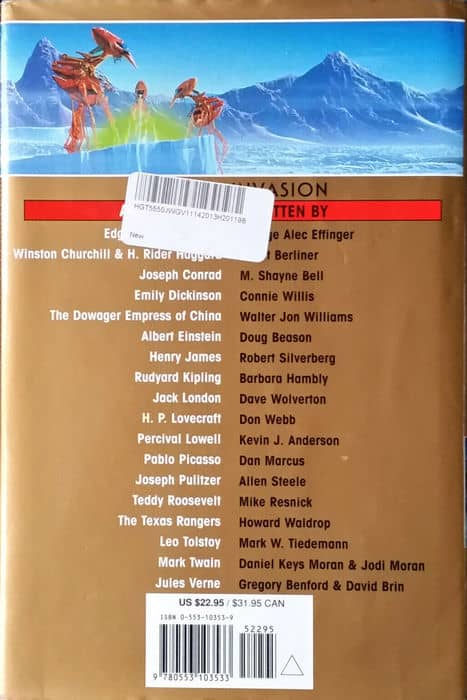 |
War of the Worlds: Global Dispatches (Spectra, 274 pages, May 1996). Covers by Roger Dean and Tim White
His story, “Log Entry,” captures what most attracted me first to space opera, at least the Robert Heinlein, Space Cadet, version. Cadet Connor Pardee’s log entries of his first mission once he graduated to full Corps status serve as half of the story. The other half tells of the ffrall, a liquid energy race that lives in the interior of an asteroid that orbits the sun eccentrically, alternately heating and cooling as it races close to the star and then retreats to the cold distance.
Anderson weaves into the story the qualities of working in space that Robert Heinlein did so well in Starship Troopers and his short story, “The Long Watch”: idealism, courage, service and selflessness.
In short, “Log Entry,” evokes a quality we are in short supply of lately, but feels hard baked into some of the best space opera: heroism.
Although in this story, Anderson puts a twist on the heroic act that elevates it from others of its ilk.
David Farland, also a long-time writing veteran and dynamite writing coach, dives into world building at its best in “Sweetly the Dragon Dreams.”
The planet Danai exists in a future that doesn’t know Earth or the origins of the humans who live on Danai, subjugated by a superior alien species. To start the story, a young human girl, Tallori, is gathering damselflies when she discovers the long dead body of a “dragon” just below the surface in a swamp. Her drunken father sees the possibilities of making a quick profit from selling pieces of it, but the dragon’s skull contains secrets that may save both the humans and their masters from destruction from an implacable space-faring species bent on destroying biological life.
Farland quickly introduces the readers to Anduval, a young human boy who gathers food to offer to the Holy Maiden Seramasia, who is somewhat akin to a queen bee for the dominant species on the planet. Facing the eminent destruction of their lives, the Holy Maiden, Tallori and Anduval form an unlikely alliance to battle what seems an inevitable fate.
Farland’s story hits many of space opera’s sweet spots: universe-spanning narrative, the grand sweep of a space-faring enemy, and the laser-like focus on a small group of characters who have to make a difference.
Similar to Casablanca, except not on Earth, and there are no Nazis. Or Paris. Or Ingrid Bergman.
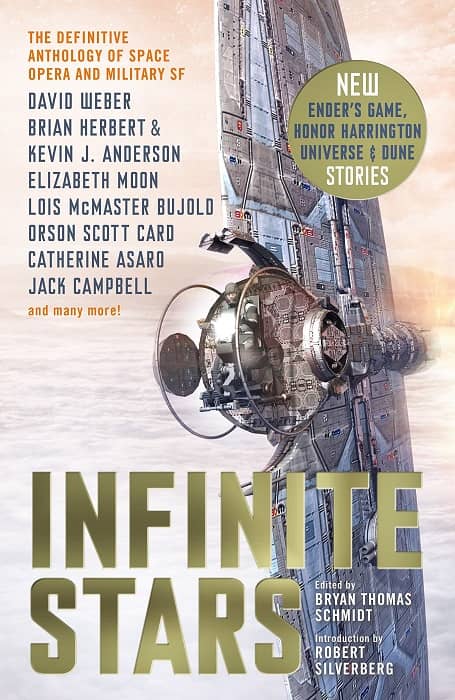 |
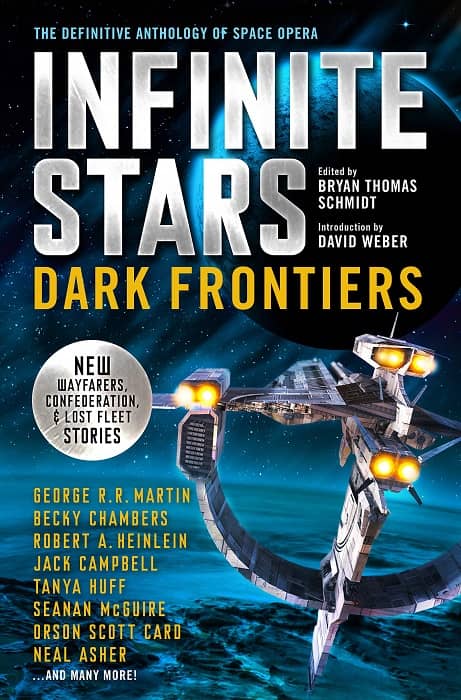 |
Infinite Stars (674 pages, October 2017) and Infinite Stars: Dark Frontiers
(624 pages, November 2019). Titan Books, covers by Luca Oleastri
For space-story junkies, Trace the Stars is a possible addition to their bookshelves. Another also worth a serious look is the Bryan Thomas Schmidt edited Infinite Stars anthology series, featuring stories by science fiction’s superstars, including Anne McCaffrey, Robert Silverberg, Cordwainer Smith, Lois McMaster Bujold and a host of others.
The heart of Space Opera still beats in the chest of science fiction. If you like it in the short form, a quick visit to your favorite book seller can give you hours of pleasurable reading. And you might also consider this: on any clear night, a sensitive science fiction reader only needs to look up to see the far-flung setting of their fondest imaginings.
James Van Pelt lives in western Colorado. He has published five collections of short fiction — including Strangers and Beggars (2002), The Last of the O-Forms & Other Stories (2005), and The Experience Arcade and Other Stories (2017) — and two novels, Summer of the Apocalypse (2006) and Pandora’s Gun (2015), all with Fairwood Press. His last Stories That Work article for us looked at fiction from Alison Wilgus and G.V. Anderson.